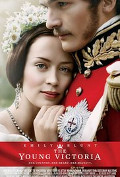
Directed by
Jean-Marc Vallee
100 minutes
Rated M
Reviewed by
Bernard Hemingway

The Young Victoria
Synopsis: The story of how the teenage Victoria (Emily Blunt) weathered the political machinations of her own family and the British Parliament to rule over Great Britain and its empire.
The Young Victoria, a courtly mix of royal love story and internecine palace politics was poorly received in its day. It must have been bad timing, for Jean-Marc Vallée’s film is a stunning production that not only seduces the eye with its lavish costume design and superb art direction and beguiles ear with its stately period music but thanks to Julian Fellowes’ script gives us a, though highly glossed I assume largely historically accurate, account of the dynastic and political battles that surrounded Victoria’s succession to the throne vacated by the death of King William (a gorgeously fruity Jim Broadbent).
The front line of engagement was provided by her own her mother, the Duchess of Kent (Miranda Richardson), and the ambitious head of her household (and presumably lover), Sir John Conroy (Mark Strong). The latter wants her to make her mother (and thereby effectively himself) regent while Prime Minister Lord Melbourne (Paul Bettany) mounts a counter-campaign to ensure she gets the crown, albeit to further his own interests. Meanwhile in Belgium, Victoria's uncle, King Leopold of Belgium (Thomas Kretschmann) is trying to shore up his dynastic line by conniving to have her marry his impoverished (well, relatively so, of course) nephew, Prince Albert (Rupert Friend), a notion which having met her, the young man finds very agreeable.
Although all this behind-the-scenes maneuvering is at times a tad difficult to follow, fans of the ins and outs (so to speak) of European royalty will lap it up. Then there are the magnificent settings which take us into Buckingham Palace, Westminster Abbey and Hampton Court amongst other iconic sites of British pomp and circumstance, all superbly shown off by cinematographer Hagen Bogdanski.
The real appeal of the film, however is the developing romance between the fiesty young Victoria and her slightly older, more retiring German first cousin. Thanks to fine performances from Blunt and Friend, Vallée deftly charts the relationship between Victoria and Albert from the tentative initial approaches to consummation, capturing all the joys of first (and in their case, only) love. Of course, particularly given Victoria’s historical image as the matriarch of 19th century moral rectitude, this is highly romanticized in 20th century terms, more fairy tale than historical recreation but it is done with such style, grace and delicacy of touch that only curmudgeons and other insensates will be disposed to cavil. The Young Victoria is a sorely under-rated film well worth rehabilitation.

Want more about this film?


Want something different?




